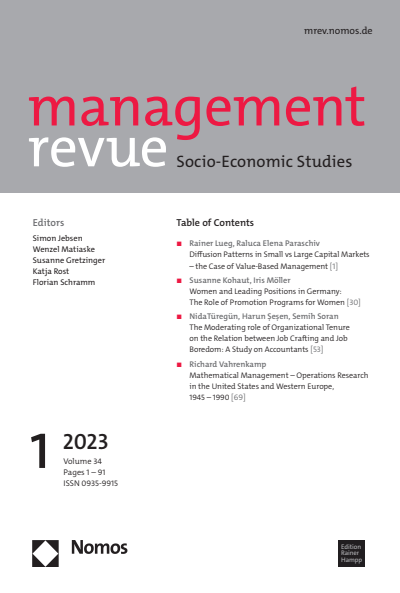Effective or Stupid? – A Note on the Organizational Economy
IF 1.7
0 MANAGEMENT
引用次数: 2
Abstract
The paper builds on the assertion that formal organizations were established to pursue specific interests. Management should contribute to organizational success, but which type of management is most effectual was debated for over one hundred years. The debate, including self-referential criticism, helped strengthen the idea of the formal organization, making effectiveness a legitimate and taken-for-granted managerial objective. This, in turn, helped sustain the organizational economy. The paper makes a distinction between intentional stupidity - designed for individuals within organizations, and accidental stupidity - the effects of organizational egoism on global sustainability. It suggests that there are echoes of the past not yet listened to, but with potentially radical implications for the world economy.有效还是愚蠢?——关于组织经济的说明
这篇论文建立在一个论断的基础上,即正式组织的建立是为了追求特定利益。管理应该有助于组织的成功,但哪种类型的管理是最有效的争论了一百多年。辩论,包括自我参照的批评,有助于加强正式组织的观念,使效率成为一个合法和理所当然的管理目标。这反过来又有助于维持组织经济。这篇论文区分了故意的愚蠢(针对组织内部的个人)和偶然的愚蠢(组织利己主义对全球可持续性的影响)。它表明,过去的回声尚未得到重视,但对世界经济有潜在的激进影响。
本文章由计算机程序翻译,如有差异,请以英文原文为准。
求助全文
约1分钟内获得全文
求助全文
来源期刊

Management Revue
MANAGEMENT-
CiteScore
1.20
自引率
0.00%
发文量
7
期刊介绍:
Management Revue - Socio-Economic Studies is an interdisciplinary European journal that undergoes peer review. It publishes qualitative and quantitative work, along with purely theoretical papers, contributing to the study of management, organization, and industrial relations. The journal welcomes contributions from various disciplines, including business and public administration, organizational behavior, economics, sociology, and psychology. Regular features include reviews of books relevant to management and organization studies.
Special issues provide a unique perspective on specific research fields. Organized by selected guest editors, each special issue includes at least two overview articles from leaders in the field, along with at least three new empirical papers and up to ten book reviews related to the topic.
The journal aims to offer in-depth insights into selected research topics, presenting potentially controversial perspectives, new theoretical insights, valuable empirical analysis, and brief reviews of key publications. Its objective is to establish Management Revue - Socio-Economic Studies as a top-quality symposium journal for the international academic community.
 求助内容:
求助内容: 应助结果提醒方式:
应助结果提醒方式:


